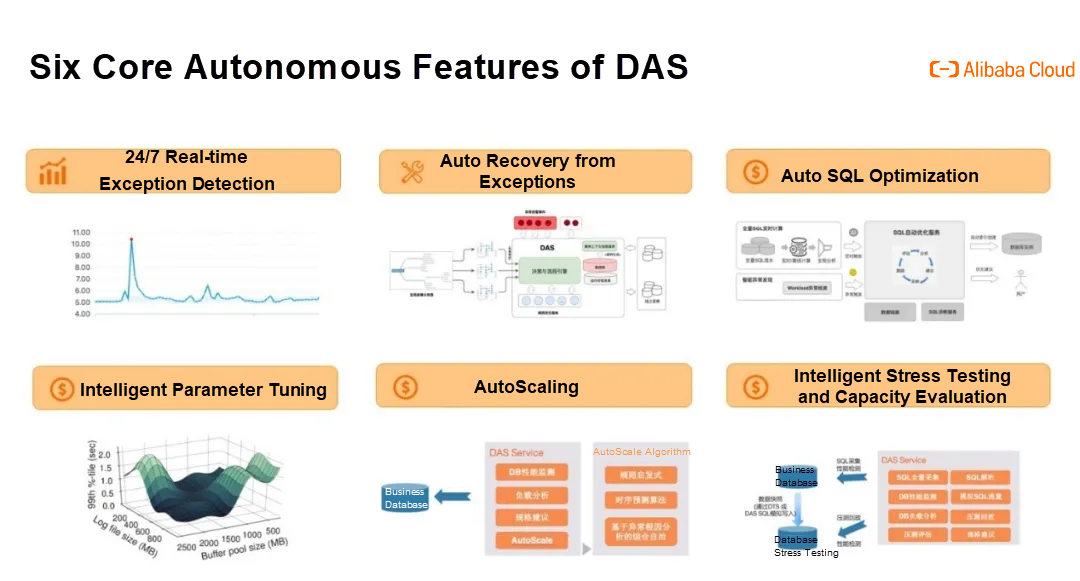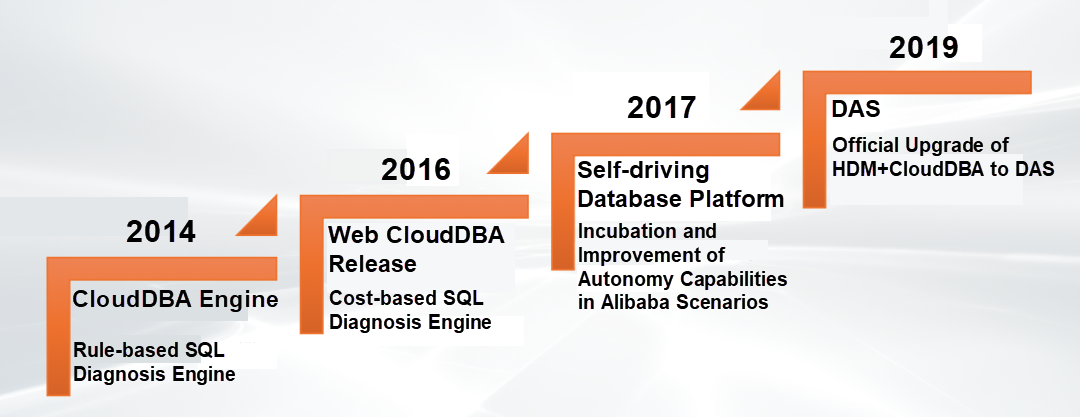By Laoyu
On April 22, Alibaba Cloud officially released its first autonomous driving database platform, Database Autonomy Service (DAS), which marks a major event in the database field.
Alibaba Cloud decided to pursue cloud-native and intelligence long ago. In the cloud-native database field, Alibaba Cloud possesses the first-ever cloud-native database in China, Apsara PolarDB, and the first-ever cloud-native data warehouse, AnalyticDB. Now, Alibaba Cloud has also made breakthroughs in intelligence, and its relevant research achievements have been presented in the Very Large Database (VLDB) 2019 and VLDB 2020 conferences.
I used the phrase "a big move" in the title to emphasize the significance of DAS's release. As the world's third and Asia's largest cloud service provider, Alibaba Cloud's DAS launch will definitively open the era of autonomous driving for off-premises databases.
It has been reported that autonomous driving has been implemented in 85% of database instances of the Alibaba Group.
As we all know, cloud databases free developers from basic O&M operations such as resource elasticity, high availability, backup, and monitoring, and greatly improve database performance.
Database Autonomy Service DAS was designed to solve pressing problems related to databases. It lets us optimize databases to improve stability and maximize performance, and also allows us to quickly troubleshoot unexpected database performance issues. Moreover, it enables us to meet business needs at the lowest resource cost.

DAS is a cloud service that implements database auto-perception, auto-troubleshooting, auto-optimization, auto-O&M, and auto-security based on machine learning and expert experience. It provides six autonomous features, covering anomaly detection, root cause analysis, decision execution, tracking, and evaluation. DAS implements a full closed-loop autonomous process without manual intervention, evaluates the effect of autonomous optimization in real-time, and enables continuous feedback and optimization.

The preceding figure shows the evolution of DAS. DAS originated as a 2016 upgrade to the CloudDBA SQL diagnostic engine. At the time, it was only an auxiliary diagnostic tool. In 2017, we decided to give it "autonomous driving" capabilities, and the service was incubated and tested in various business scenarios of the Alibaba Group. In 2019, Alibaba Cloud officially released DAS for external users.
DAS is an "autonomous driving" platform for databases. DAS can work as a single database engine or can support all databases in its database product family, including ApsaraDB PolarDB, AnalyticDB, ApsaraDB for RDS (RDS), and ApsaraDB for Redis. This means it supports online transaction processing (OLTP), online analytical processing (OLAP), and NoSQL databases.
Next, we need to consider the level of DAS in autonomous driving tools, and how it stands out from similar products. For databases with autonomous driving features, different levels correspond to very different capabilities. Currently, the autonomous driving capabilities of databases are classified into the following levels:
Li Guangwang, a senior technical expert at Alibaba Cloud and the head of the DAS product line, said that DAS had exceeded level 3 and was approaching level 4. In other words, DAS is fully autonomous in some scenarios and requires no human intervention. This obviously distinguishes DAS from the products of other vendors. Based on reports, the autonomous services of some cloud vendors are still in the auxiliary diagnosis stage because decisions still need to be made and executed by humans, a fundamental difference.
DAS provides autonomous capabilities in a majority of scenarios. According to Li Guangwang, DAS-based practices in the Alibaba Group can cover 90% of scenarios and reduce database management costs by 90%. However, Alibaba Cloud does not define DAS as a level 4 product because of the maximal protection policy used in order to avoid negative effects and uncertainty for users.
Alibaba Cloud DAS has been verified with all databases of the Alibaba Group over about three years, and it is widely used in Alibaba's internal business scenarios. It has optimized more than 42 million SQL statements, reclaimed more than 4 PB in storage space, and served a large number of enterprises in industries such as e-commerce, finance, and gaming.
When it comes to databases, performance must be considered. No database has ever had enough performance. This is why all databases need fine-grained optimization.
If the transformation from traditional databases to cloud-native databases is the first leap in the database field, autonomous driving for databases must be the second leap because it enables databases to easily achieve optimal performance.
From manual processing to autonomous driving, from troubleshooting to prevention, from monitoring to automatic mitigation, from local optimization to global optimization, and from rule-based to AI-based, all these transitions represent the progress in technology.
Alibaba Cloud expects that 80% of off-premises databases will implement autonomous driving in the next three years. To a certain extent, the autonomous driving of cloud databases will definitely speed up the process of migrating databases to the cloud.
Visit the official page of DAS to learn more.
A Small Victory – Acceleration of BITFIELD Commands for ApsaraDB for Redis
AnalyticDB: Alibaba Cloud's Cloud-native Data Warehouse Broke the TPC-DS World Record
ApsaraDB - July 8, 2020
Rupal_Click2Cloud - September 15, 2023
Alibaba Clouder - December 21, 2020
ApsaraDB - June 29, 2020
Alibaba Cloud New Products - June 1, 2020
ApsaraDB - December 5, 2022
 PolarDB for PostgreSQL
PolarDB for PostgreSQL
Alibaba Cloud PolarDB for PostgreSQL is an in-house relational database service 100% compatible with PostgreSQL and highly compatible with the Oracle syntax.
Learn More PolarDB for Xscale
PolarDB for Xscale
Alibaba Cloud PolarDB for Xscale (PolarDB-X) is a cloud-native high-performance distributed database service independently developed by Alibaba Cloud.
Learn More PolarDB for MySQL
PolarDB for MySQL
Alibaba Cloud PolarDB for MySQL is a cloud-native relational database service 100% compatible with MySQL.
Learn More DBStack
DBStack
DBStack is an all-in-one database management platform provided by Alibaba Cloud.
Learn MoreMore Posts by ApsaraDB